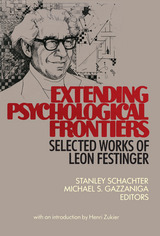2 books by Gazzaniga, Michael

The Ethical Brain
Michael S. Gazzaniga
Dana Press, 2005
Will increased scientific understanding of our brains overturn our beliefs about moral and ethical behavior? How will increasingly powerful brain imaging technologies affect the ideas of privacy and of self-incrimination? Such thought-provoking questions are rapidly emerging as new discoveries in neuroscience have raised difficult legal and ethical dilemmas. Michael Gazzaniga, widely considered to be the father of cognitive neuroscience, investigates with an expert eye some of these controversial and complex issues in The Ethical Brain.
He first examines "lifespan neuroethics" and considers how brain development defines human life, from when an embryo develops a brain and could be considered "one of us" to the issues raised as the brain ages, such as whether we should have complete freedom to extend our lives and enhance our brains through the use of genetics, pharmaceuticals, and training.
Gazzaniga also considers the challenges posed to the justice system by new discoveries in neuroscience. Recent findings suggest that our brain has already made a decision before we become fully aware of doing so, raising the question of whether the concept of personal responsibility can remain a fundamental tenet of the law. Gazzaniga argues that as neuroscience learns more about the unreliability of human memory, the very foundation of trial law will be challenged.
Gazzaniga then discusses a radical re-evaluation of the nature of moral belief, as he not only looks at possibly manipulating the part of the brain that creates beliefs but also explores how scientific research is building a brain-based account of moral reasoning.
The Ethical Brain is a groundbreaking volume that presents neuroscience's loaded findings—and their ethical implications—in an engaging and readable manner, offering an incisive and thoughtful analysis of the medical ethics challenges confronting modern society at the dawn of the twenty-first century.
He first examines "lifespan neuroethics" and considers how brain development defines human life, from when an embryo develops a brain and could be considered "one of us" to the issues raised as the brain ages, such as whether we should have complete freedom to extend our lives and enhance our brains through the use of genetics, pharmaceuticals, and training.
Gazzaniga also considers the challenges posed to the justice system by new discoveries in neuroscience. Recent findings suggest that our brain has already made a decision before we become fully aware of doing so, raising the question of whether the concept of personal responsibility can remain a fundamental tenet of the law. Gazzaniga argues that as neuroscience learns more about the unreliability of human memory, the very foundation of trial law will be challenged.
Gazzaniga then discusses a radical re-evaluation of the nature of moral belief, as he not only looks at possibly manipulating the part of the brain that creates beliefs but also explores how scientific research is building a brain-based account of moral reasoning.
The Ethical Brain is a groundbreaking volume that presents neuroscience's loaded findings—and their ethical implications—in an engaging and readable manner, offering an incisive and thoughtful analysis of the medical ethics challenges confronting modern society at the dawn of the twenty-first century.
[more]

Extending Psychological Frontiers
Stanley Schachter
Russell Sage Foundation, 1989
Leon Festinger's forty-year scrutiny of that "curious animal, the modern human being" fundamentally transformed psychological thinking and shaped an entire scientific field, that of social psychology. The twenty-four papers brought together for the first time in Extending Psychological Frontiers encompass the classic contributions and critical turning points of Festinger's long career. Spanning the post-war decades, this unprecedented volume reveals the full scope, diversity, and import of Festinger's work. Its thematic arrangement clarifies the complex network of problems that preoccupied Festinger and the unique imaginative style that characterized his intellect. Whether examining the voting behavior of Catholics and Jews, the meaning of minute eye movements, the decisions of maze-running rats, or the proselytizing behavior of cultists, Festinger consistently transcended the traditional bounds of the discipline. His theory of cognitive dissonance, which describes how people attempt to resolve the tensions that result when they hold simultaneously two inconsistent beliefs, challenged preexisting psychological theories and produced more important ideas and experimentation than any other development in social psychology. Major writings on group dynamics, decision making, and perceptual processes further underscore the impact of Festinger's research not only on psychology, but also on a wide range of intellectual fronts, from literary theory to ethnology and from historical studies to contemporary political analysis. Extending Psychological Frontiers is an invaluable resource, providing a comprehensive and coherent picture of an extraordinary body of work.
[more]
READERS
Browse our collection.
PUBLISHERS
See BiblioVault's publisher services.
STUDENT SERVICES
Files for college accessibility offices.
UChicago Accessibility Resources
home | accessibility | search | about | contact us
BiblioVault ® 2001 - 2024
The University of Chicago Press









